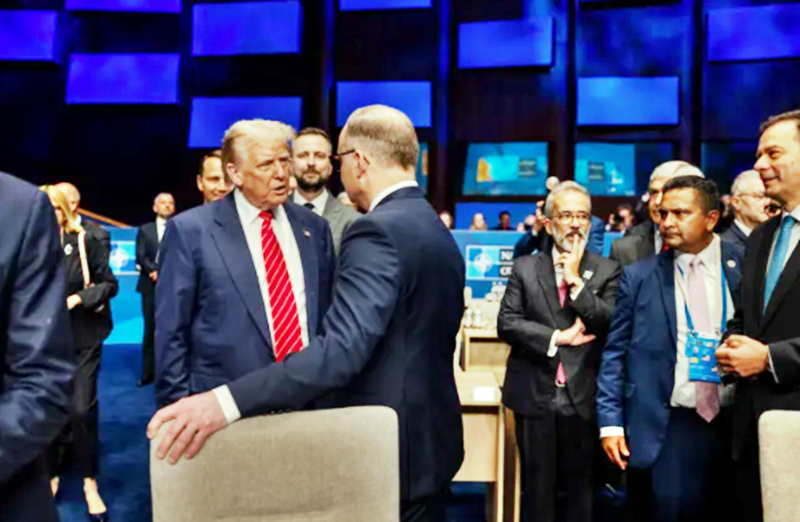Next Week, Trump and Netanyahu Will Meet at the White House to Plan Their ‘New Middle East’

By SheerPost-Mitchell Plitnick / Mondoweiss - July 6, 2025
U.S. President Donald Trump seems to have largely moved on from Iran and is now setting his sights on instituting a broader new order in the Middle East. Trump’s vision consists of an Israel-centric regional order that sees Iran and Hezbollah defeated and normalization with Israel spreading across the region, from Lebanon and Syria to Oman and Saudi Arabia.
Joining him in creating this vision is Israeli Prime Minister Benjamin Netanyahu, who is slated to visit the White House on Monday.
While there are potentially many obstacles to enacting this U.S./Israeli plan, it is clear that one focus is to quash any Palestinian aspirations for freedom.
The aftermath of the attack on Iran
Trump had little to say about Iran’s decision to suspend its cooperation with the International Atomic Energy Agency (IAEA), contenting himself with a State Department statement calling the decision “unacceptable.” For his own part, Trump has downplayed any continuing negotiations with Iran, claiming they would serve no purpose, given that he claims (inaccurately) that American strikes have “obliterated” Iran’s nuclear program.
Meanwhile, Trump has been pressing Israeli Prime Minister Benjamin Netanyahu to find an off-ramp in Gaza. He claims that Israel has accepted an American proposal for a 60-day ceasefire that would see the return of ten living Israeli hostages and an additional 15 bodies of hostages who died or were killed while in captivity. Israel has yet to confirm, despite misleading reports to the contrary.
Whether there is a path toward Hamas accepting such a proposal is unclear, given that Hamas has insisted that they will only agree to a deal if it means freeing all the hostages in exchange for a permanent end to Israel’s genocide in Gaza. Ha’aretz reported on Thursday that Hamas “was satisfied” with the terms of the American proposal, but their source for this news, the New York Times, contained no mention of such satisfaction.
Yet the Trump administration is clearly trying to get a ceasefire, and there is good reason to believe they do want to end the genocide. How far they will go to achieve that goal is an open question, but there is also the possibility that Netanyahu might be more amenable than he has been in the past.
The reason for all of this has nothing to do with the Palestinians, but rather the region at large and domestic Israeli politics.
Netanyahu’s strengthened position
In the wake of the strikes on Iran, Netanyahu is in a stronger position politically than he has been in a long time. Polls suggest that neither he nor the opposition can cobble together a coalition if elections were held today. That’s familiar territory for Netanyahu.
The problem he still faces is the corruption charges for which his trial is never-ending. Trump’s intervention, calling for the charges against Netanyahu to be dropped, is telling in this regard.
While it is unlikely that Trump’s call will move the attorney general (whom Netanyahu is trying to fire) to drop the charges or for the President, Isaac Herzog, to pardon Netanyahu (something it is not clear he can do without Netanyahu being convicted first), it does indicate that Trump recognizes the need to remove this trial from Netanyahu’s path.
Trump has certainly heard from Netanyahu that he cannot end the genocide in Gaza — because if he does, this trial will swallow him up and end his premiership in Israel. That is the sort of self-interest that Trump understands. But he also knows that the ambition he has for the region, which centers on a massive expansion of the Abraham Accords and widespread normalization between key Arab states and Israel, cannot move forward while the genocide continues.
If Netanyahu’s government lasts until the next elections, which are scheduled for the end of October 2026, it is possible he could postpone them if he can make the case that the “security situation” demands it. But, given the diminished capacities of Iran and Hezbollah, the fall of Bashar al-Assad, and the fact that Hamas and other Palestinian groups are both diminished in terms of arms and too busy getting bombed and starving to pose much of a threat to Israeli citizens, that would be a difficult case to make.
So, for Netanyahu, everything hinges on the corruption trial disappearing. It’s less crucial for Trump, as his plans would probably be supported by anyone who could defeat Netanyahu, be that former Prime Minister Naftali Bennett, or opposition leaders Yair Lapid or Gadi Eizenkot (Benny Gantz, who last opposed Netanyahu, has faded badly).
But the coalition they would form would be less militant, as it would not feature extreme ideologues like Bezalel Smotrich and Itamar Ben-Gvir or supportive religious parties such as Shas and United Torah Judaism. It would still have plenty of right-wing figures, like Bennett and Avigdor Liberman, but it would be a coalition that was at once a bit more pragmatic than Netanyahu’s and a bit less in tune with Trump’s brand of right-wing populism.
On top of all of that, the moment of triumphalism over the strikes on Iran is now. Already, more and more people are becoming aware of the fact that the operations against Iran, though devastating in many ways, did not “obliterate” Iran’s nuclear program. But they did change a lot of minds in Iran that had been reluctant to pursue a nuclear weapon. Although Iran is sticking with the Nuclear Non-Proliferation Treaty for the moment, its decision to quit cooperating with the IAEA opens the door for leaving the NPT. The attacks on Iran have convinced many Iranians that only a nuclear deterrent will stop future attacks by Israel and the U.S.
What does Trump want?
In the wake of the American attack on Iranian nuclear facilities, Donald Trump’s key mediator, Steve Witkoff, teased that there were potentially several new and surprising countries that might soon join the Abraham Accords.
One can only guess at what countries Witkoff was referring to, but some Israeli and Arab diplomats suggested that Saudi Arabia might be willing to at least resume discussions on normalization and that Oman might be willing to entertain normalization talks. Both would only happen if the genocide in Gaza stops.
There is also Syria. Ahmad al-Sharaa, the country’s new leader, has made no secret of his willingness to find an accommodation with Israel. For Trump, this means normalization. But the situation there is far more fraught than Trump might think. There are major obstacles to normalization with Israel.
Beyond the ongoing genocide in Gaza, there is the outstanding issue of the Golan Heights. Trump may have recognized Israel’s sovereignty over the portion of the Golan that Israel captured before the armistice with Syria in 1974, but the rest of the world, and certainly the Syrian people across the ethnic and political spectrum, have not.
Al-Sharaa is not in a very secure position in Syria, to say the least. Skepticism about his rule remains in the country as well as in the wider Arab world and the West. Years ago, there were various scenarios about compromise on the Golan, mostly pursued under the rule of Hafez al-Assad. But it’s been many years since any substantive discussions took place. They were controversial in Syria then, and they would be even more so now.
A deal with Israel and the American support it would bring would be a huge boon to the shattered Syrian economy, which gives al-Sharaa some room to maneuver. Syria has been said to have proposed two scenarios in which it would get back part of the Golan that Israel seized prior to the armistice between the two states in 1974.
Israel would have to be willing, however, to make that compromise and withdraw from all of the territory it invaded after Bashar al-Assad’s fall and, obviously, cease all its attacks in Syria. Whether Israel would be willing to do that is very much open to question.
More than that, al-Sharaa has to consider the response to compromising any part of the Golan domestically. If he gets a significant part of the Golan back, it might be enough, given the dire need in Syria and the potential for a deal to address that need. But Israeli Foreign Minister Gideon Sa’ar said recently that, “Israel applied its laws to the Golan Heights over 40 years ago, and in any peace agreement, the Golan will remain an inseparable part of the State of Israel.”
Lebanon has also attracted Trump’s attention. It is doubtful that even in his most wide-eyed moments, Trump believes the shaky Lebanese government could agree to relations with Israel, even if Israel withdrew from the areas of southern Lebanon it still occupies and stopped its ongoing (though rarely reported very widely) attacks in Lebanon.
Instead, Trump wants to see Hezbollah fully disarmed, a goal shared by Lebanon’s new President, Joseph Aoun. But where Aoun wants to do this gradually, through dialogue as a path to Lebanese unity, Trump wants it done quickly and in a way that visibly diminishes Hezbollah — not only as a military force but as a political power.
U.S. envoy Tom Barrack has been pushing the government to quickly move to disarm Hezbollah. That indicates a reckless impatience on the part of the Trump administration that threatens to undermine the efforts by the Lebanese government under Aoun to negotiate Hezbollah’s disarmament and establish the Lebanese Armed Forces as the sole defender of Lebanon.
Hezbollah has already stated its refusal to the American plan. It has indicated its willingness to engage in dialogue with Aoun, but its position is that it will not disarm. Aoun would have to negotiate a deal to change their minds. He has also demanded that progress on disarming Hezbollah be met with steps by Israel to back out of its ongoing occupation of Lebanese territory and its routine attacks.
Israel, for its part, is not showing much flexibility, demanding that Hezbollah be disarmed immediately, that its forces be moved even farther north than they’ve already gone, and indicating it will not give up its positions in southern Lebanon, offering to abandon only one of the five sites it occupies.
The vision for Netanyahu’s visit
What emerges from all of this is that Trump envisions Syria joining Jordan and Egypt as neighbors that make peace with Israel, with Lebanon joining that group sometime in the future. If Oman can be persuaded to join the Abraham Accords alongside Gulf Arab states Bahrain and the UAE, this would pave the way for Saudi Arabia to join as well.
With what Trump sees as a chastened Iran forced to watch from the sidelines, that would create a Middle East whose center is in an exclusively Israeli Jerusalem. Iran, Iraq, and even Yemen would be forced to reckon with a playing field that forefronts Israel, relegates the Palestinians to an afterthought, and strongly incentivizes states that haven’t normalized with Israel to find an accommodation with Israel and its Arab partners.
In Trump’s view, this could all be accomplished merely by ending the genocide in Gaza, not requiring an actual Palestinian state or any other measure of freedom for the Palestinian people.
Is that realistic? Certainly not within the kind of timeframe Trump envisions.
The Saudis would, if the genocide ended and a number of other states normalized relations with Israel, find a reason to join, given the right amount of bribes from Washington, probably including help on a Saudi nuclear program and significantly upgraded weapon sales. They would likely go back to demanding some vague roadmap to a Palestinian state, but would not demand a more solid commitment to a process as they are doing now.
But in Syria and Lebanon, the opposition would be tremendous, and it would very likely be supported by many voices in Jordan and Egypt, and obviously, in Iran, Iraq, and Yemen. The repression against such solidarity would need to be draconian, and it’s not at all clear that Syria or Lebanon has either the security capacity or the political space to do that. Indeed, abandoning the Palestinians to that degree, while perhaps not unprecedented for Arab leaders, would spark considerable outrage in both Jordan and Egypt as well and, at least in Jordan, could very well be fatally destabilizing.
Netanyahu might be willing to embrace this as a long-term vision as he sits with Trump in Washington next week. But he knows it can’t be achieved in the short term. Instead, he is going to move forward with the genocide in Gaza until Trump makes him stop.
Meanwhile, pressure from Netanyahu’s Likud party to annex the West Bank is growing, with some ultra-nationalists also calling to annex Gaza.
Netanyahu is not likely to approve such moves as long as Trump’s efforts to expand normalization keep moving forward. If and when they fail, however, Netanyahu will be ready with annexation. This is likely a tool Trump will use in pressing Arab leaders to normalize relations with Israel.
In all of it, whichever direction events move, the Palestinians are, once again, being set up for abandonment. The question is how long Arab leaders can keep a lid on the outrage throughout the region and how long Western leaders will continue to ignore and repress the growing anger over the support Israel is getting from our governments.
Please share this story and help us grow our network!
Editor’s Note: At a moment when the once vaunted model of responsible journalism is overwhelmingly the play thing of self-serving billionaires and their corporate scribes, alternatives of integrity are desperately needed, and ScheerPost is one of them. Please support our independent journalism by contributing to our online donation platform, Network for Good, or send a check to our new PO Box. We can’t thank you enough, and promise to keep bringing you this kind of vital news.
You can also make a donation to our PayPal or subscribe to our Patreon.

Mitchell Plitnick
Mitchell Plitnick is the president of ReThinking Foreign Policy. He is the co-author, with Marc Lamont Hill, of Except for Palestine: The Limits of Progressive Politics. Mitchell’s previous positions include vice president at the Foundation for Middle East Peace, Director of the US Office of B’Tselem, and Co-Director of Jewish Voice for Peace.
You can find him on Twitter @MJPlitnick.-Author Site
